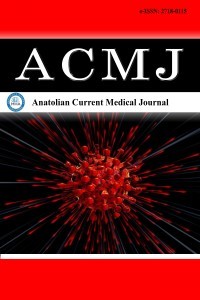1.
Global Cancer Observatory: Cancer Today 2020. . Availablefrom: https://gco.iarc.fr/today/data/factsheets/cancers/6-Oesophagus-fact-sheet.pdf.
2.
Uhlenhopp DJ, Then EO, Sunkara T, Gaduputi V. Epidemiologyof esophageal cancer: update in global trends, etiology and riskfactors. Clin J Gastroenterol 2020; 13: 1010-21.
3.
Rustgi AK, El-Serag HB. Esophageal carcinoma. N Engl J Med2014; 371: 2499-509.
4.
van Heijl M, van Lanschot JJ, Koppert LB, et al. Neoadjuvantchemoradiation followed by surgery versus surgery alone forpatients with adenocarcinoma or squamous cell carcinoma of theesophagus (CROSS). BMC Surg 2008; 8: 21.
5.
Donohoe CL, O’Farrell NJ, Grant T, et al. Classification ofpathologic response to neoadjuvant therapy in esophageal andjunctional cancer: assessment of existing measures and proposalof a novel 3-point standard. Ann Surg 2013; 258: 784-92.
6.
Noble F, Lloyd MA, Turkington R, et al. Multicentre cohortstudy to define and validate pathological assessment of responseto neoadjuvant therapy in oesophagogastric adenocarcinoma. BrJ Surg 2017; 104: 1816-28.
7.
Bekes EM, Schweighofer B, Kupriyanova TA, et al. Tumor-recruited neutrophils and neutrophil TIMP-free MMP-9 regulatecoordinately the levels of tumor angiogenesis and efficiency ofmalignant cell intravasation. Am J Pathol 2011; 179: 1455-70.
8.
Liang W, Ferrara N. The complex role of neutrophils in tumorangiogenesis and metastasis. Cancer Immunol Res 2016; 4: 83-91.
9.
Moses K, Brandau S. Human neutrophils: Their role in cancerand relation to myeloid-derived suppressor cells. Semin Immunol2016; 28: 187-96.
10.
Rabinowich H, Cohen R, Bruderman I, Steiner Z, Klajman A.Functional analysis of mononuclear cells infiltrating into tumors:lysis of autologous human tumor cells by cultured infiltratinglymphocytes. Cancer Res 1987; 47: 173-7.
11.
Lanitis E, Dangaj D, Irving M, Coukos G. Mechanisms regulatingT-cell infiltration and activity in solid tumors. Ann Oncol 2017;28: 18-32.
12.
Honn KV, Tang DG, Crissman JD. Platelets and cancer metastasis:a causal relationship? Cancer Metastasis Rev 1992; 11: 325-51.
13.
Gao QF, Qiu JC, Huang XH, et al. The predictive and prognosticrole of a novel ADS score in esophageal squamous cell carcinomapatients undergoing esophagectomy. Cancer Cell Int 2018; 18:153.
14.
Amin MB, Edge SB, Greene FL. AJCC cancer staging manual8ed. New York: Springer; 2017.
15.
Zhao K, Wang C, Shi F, Li M, Yu J. Lymphocyte-monocyte ratioas a predictive marker for pathological complete response toneoadjuvant therapy in esophageal squamous cell carcinoma.Transl Cancer Res 2020; 9: 3842-53.
16.
Chen JH, Zhai ET, Yuan YJ, et al. Systemic immune-inflammationindex for predicting prognosis of colorectal cancer. World JGastroenterol 2017; 23: 6261-72.
17.
Gao Y, Guo W, Cai S, et al. Systemic immune-inflammationindex (SII) is useful to predict survival outcomes in patientswith surgically resected esophageal squamous cell carcinoma. JCancer 2019; 10: 3188-96.
18.
Bogaerts J, Ford R, Sargent D, et al. Individual patient dataanalysis to assess modifications to the RECIST criteria. Eur JCancer 2009; 45: 248-60.
19.
Buzby GP, Mullen JL, Matthews DC, Hobbs CL, Rosato EF.Prognostic nutritional index in gastrointestinal surgery. Am JSurg 1980; 139: 160-7.
20.
Onodera T, Goseki N, Kosaki G. [Prognostic nutritional index ingastrointestinal surgery of malnourished cancer patients]. NihonGeka Gakkai Zasshi 1984; 85: 1001-5.
21.
Fu X, Li T, Dai Y, Li J. Preoperative systemic inflammation score(SIS) is superior to neutrophil to lymphocyte ratio (NLR) as apredicting indicator in patients with esophageal squamous cellcarcinoma. BMC Cancer 2019; 19: 721.
22.
Cai G, Yu J, Meng X. Predicting prognosis and adverse eventsby hematologic markers in patients with locally advancedesophageal squamous cell carcinoma treated with neoadjuvantchemoradiotherapy. Cancer Manag Res 2020; 12: 8497-507.
23.
Asher V, Lee J, Innamaa A, Bali A. Preoperative plateletlymphocyte ratio as an independent prognostic marker inovarian cancer. Clin Transl Oncol 2011; 13: 499-503.
24.
Hirahara N, Tajima Y, Fujii Y, et al. Preoperative prognosticnutritional index predicts long-term surgical outcomes inpatients with esophageal squamous cell carcinoma. World J Surg2018; 42: 2199-208.
25.
Wu Y, Chen J, Zhao L, et al. Prediction of pathologic responseto neoadjuvant chemoradiotherapy in patients with esophagealsquamous cell carcinoma incorporating hematologicalbiomarkers. Cancer Res Treatment 2021; 53: 172-83.
26.
Koh HK, Park Y, Koo T, et al. Neutrophil-to-lymphocyte ratioafter definitive concurrent chemoradiotherapy predicts survivalin patients with esophageal squamous cell carcinoma. In Vivo2021; 35: 1133-9.
27.
Herskovic A, Russell W, Liptay M, Fidler MJ, Al-Sarraf M.Esophageal carcinoma advances in treatment results for locallyadvanced disease: review. Ann Oncol 2012; 23: 1095-103.
28.
Yang H, Liu H, Chen Y, et al. Long-term efficacy of neoadjuvantchemoradiotherapy plus surgery for the treatment oflocally advanced esophageal squamous cell carcinoma: theNEOCRTEC5010 randomized clinical trial. JAMA Surg 2021;156: 721-9.

